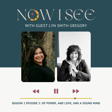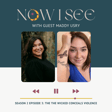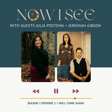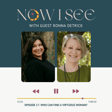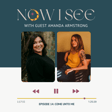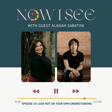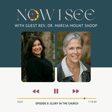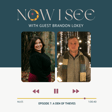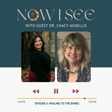Become a Creator today!Start creating today - Share your story with the world!
Start for free
00:00:00
00:00:01

Lift Up Thy Voice: Speaking Up Against Bob Jones University with Andrew Pledger
Whether you’re familiar with BJU or not, it has had an impact on your life in some way, and probably not for the better. The ultra-conservative, fundamentalist institution is well-known for it’s strict practices, harsh standards, and unmistakable students.
In this episode, I’m joined by Andrew Pledger, former BJU student and creator of the podcast, Surviving BJU: A Christian Cult. Together, we discuss his experiences there, what he’s learned since, and how he’s Speaking Up louder now than ever.
Links:
Links
Transcript
Introduction and Guest Introduction
00:00:01
Speaker
I was lost in utter darkness I was trapped in toxic shame I was bound by my religion Till I chose to break away
00:00:24
Speaker
Now I'm finding my true colors For the first time I feel free Now I'm learning self compassion And as I heal I'm finding peace
00:00:51
Speaker
Welcome to Now I See, eye-opening stories from the formerly faithful. I'm your host, Amber White, and here, me and my guests share our experiences in loving and leaving rigid faith systems. Together, we shine a light on the dark corners of these institutions and share the joys of rebuilding life on our own terms. I promise you'll leave inspired, even if you are a little teary-eyed.
00:01:24
Speaker
Hi, and welcome back to Now I See. I'm your host, Amber White, and I know my voice is a little rough at the moment, but I'm here and I'm full of a very strong cough medicine and an even stronger will to not miss another week of putting this special episode out there.
00:01:45
Speaker
I'm talking with fellow podcast creator and host Andrew Pledger of the Surviving BJU podcast and formerly the Speaking Up podcast.
Experiences of Leaving Fundamentalism
00:01:56
Speaker
Andrew and I found each other through our respective podcasts, Instagram accounts, not even realizing we were neighbors.
00:02:03
Speaker
I've had the pleasure of sitting in local coffee shops with him, talking for hours about what we're doing and going through, and I even had the privilege of recording this episode with him in my home, where we shared a meal and many laughs.
00:02:19
Speaker
Like myself, Andrew is a former fundamentalist that attended a strict Bible college because the pressure to attend is on. And I applaud him for his devotion because I only made it one year, and he somehow made it to his senior year before being expelled for being outspoken in his disagreements with Bob Jones University's teachings. Andrew does a great job of sharing his story, so I won't spoil it here. But
00:02:48
Speaker
I do want to commend him on a fantastic season of surviving BJU. It takes a lot of courage to speak out about things that the majority either agree with, go along with to keep the peace, or are fine not questioning, and he has created a platform for not just himself, but so many others to exercise that courage.
00:03:12
Speaker
Whether you are familiar with Bob Jones University or not, your life, yes yours, has been impacted by its existence, especially if you live in South Carolina. BJU has been considered the crown jewel of fundamentalist higher education for decades.
00:03:30
Speaker
and it has had far-reaching implications for regional and national politics, education as a whole, and human rights. You'd be surprised at just how much of an impact it has had on everyday American life. I've put links to surviving BJU in the show notes, along with ways that you can engage with Andrew. He is a true delight, so I hope that you will.
00:03:57
Speaker
Also, I'd like to extend my most sincere gratitude to everyone who reached out and wished me well last week when I announced I'd have to delay this episode. It meant a lot to me, and I feel so loved and supported by this community of people. So, thank you very much, and I hope you all are also taking great care of yourselves.
Podcast Creation and Collaboration
00:04:20
Speaker
Alright, let's get into this incredible story.
00:04:35
Speaker
Hi, Andrew. Thank you so much for being with me today. I'm excited that we get to record. Finally, we've been planning this for months and that we get to record in person and that you came over for Indian food before we did this.
00:04:47
Speaker
Thank you so much for having me. I've been looking forward to this for so, so long. Me too. I am just really impressed by all that you've done so soon after leaving too and by how passionate you are, how organized you are, which we love to talk about. We both are so organized. We are so organized and also just the passion that you bring to this for the people who are doing it.
00:05:12
Speaker
I love the way you're willing to say what needs to be said and not apologize for it. It's something that
Andrew's IFB Background and Family History
00:05:19
Speaker
I really admire and have learned a lot from. So thank you for everything you bring. Of course. Yeah. So I'm really excited to introduce guests to you because they're going to get to learn about two podcasts, one that you've
00:05:30
Speaker
kind of has led you into the big one that you've just recently introduced, which is surviving BJU. I'm excited for us to talk about that one. But before we get into where you're at now, I like for listeners to know where you came from. So how did your life start? What faith were you involved in? And what did that look like for you?
00:05:50
Speaker
Yeah, I kind of laugh at that sometimes because it's such a big question. It's like so much has happened to like bring me to this point and I'm glad to be and really proud to be at this point but I was raised in the independent fundamental Baptist movement which I know you are
00:06:10
Speaker
from, sadly. When we met online and you're like, oh, I'm IFB. And I'm like, yes, you get it. We understand each other. Yes. And it's so awesome to connect with other survivors. And you don't feel like you have to explain yourself. You don't have to share all the details or all the stories because they just get it. They came from that same toxic, high control environment. So just for a little history of my parents, they were both
00:06:40
Speaker
They weren't exactly born into the IFB so like my mom's parents they were Methodist and then got recruited into the IFB and then once that happened my Nana went crazy into it and then my mom became very dedicated to it and they became involved in an IFB church and that's where they stayed at for a long time. I can't remember how many IFB churches they were at because I know they moved at least once
00:07:03
Speaker
But whatever church they went to, it was IFB because that was the best way or really like the only legitimate way to be a Christian, the only right
00:07:13
Speaker
It's not a denomination, but it was like the right background that they thought at least. And so with my dad, his, I think his mom, I'm not sure what age he got involved with it, but his dad was not really Christian. But then once he converted in the IFB movement, he became like really involved with it. And then of course my dad took it on, but how my parents met, they met at a college called Heil's Anderson College. Yes, okay.
00:07:42
Speaker
And this, for people who aren't familiar, this college, I was going to say how it is, it was started by cult leader, Jack Hiles. And he's the leading figure in the IFB movement. He, the, the Hiles Anderson college is attached to first Baptist of Hammond, which I think it still is, but it's known as like the largest IFB church in America. And it had a, at one time it had a hundred thousand members.
00:08:11
Speaker
That's a lot for an IFB. That is massive. And I know they had over 100 buses for their bus ministry. So that's the thing with the IFB. They're known for wanting to like grow and bring in their numbers because the church I grew up in, we had a really big bus ministry. We had over 50 buses we had that were bringing people. So my parents met at this college. That's a part of just this
00:08:34
Speaker
Oh, massive IFB indoctrination machine, basically. So my dad was studying to be a pastor, my mom, a Christian school teacher, and they struggled to have children. That's a big part of their story. Interesting. They were going to adopt, actually. They were looking to adopt. It took them six to seven years to have children. That's an eternity in the fundamentalist realm for somebody who's married.
00:08:59
Speaker
Yes, like you're expected to just have immediately within a year. And so to them, they didn't think in their beliefs, Oh, like God's not blessing us or whatever. So they wanted to adopt, but all of a sudden they had three boys.
00:09:15
Speaker
Really? Great voice. A miracle. Yes. So that made them think that, oh, God answered our prayers. And it made them much more dedicated to raising us and what they thought was the right way or the Christian way. So I was, me and my brothers, we were homeschooled K through 12. So I was born in 2000 and I was homeschooled from 2005 to 2018.
00:09:43
Speaker
Wow. Yeah. So the whole time? The whole time. The whole time. The whole time. We do really understand each other. Yes. Yes. Yeah. And the curriculum we use was a Becca, which was produced by Pensacola Christian College. I know it well.
Life and Challenges in IFB
00:09:59
Speaker
Yeah. Oof.
00:10:02
Speaker
It's an interesting curriculum. They're very rigid. It's a good word for it. Yes. And like they, I mean, I mean, you know, Pensacola, they're IFB also. So it has the whole KJV only in it. There's like literally verses, even in that math book, it takes a creationism stance and their spelling was so fucking hard.
00:10:24
Speaker
God damn it. It was so fucking... I'm good at spelling things, so whatever. They take the English language very seriously.
00:10:34
Speaker
I was an English major at Pensacola, so that's why I can say that with so much authority, that and having studied under them for so long. Yeah, so I was raised in an IFB movement and the IFB church that my parents joined in, that's the interesting thing. My dad, he left the ministry before I was born. I'm not sure what year. And my mom has only told me about this. He was so miserable in him. He was so unhappy.
00:11:00
Speaker
So here he had dedicated his life to it and he went to college to study it and then he just doesn't realize during that time that's not for me but in that environment you are indoctrinated of like your only purpose on earth is to spread this message.
00:11:15
Speaker
That's why you're here. And I remember, I remember being told that growing up, like you should be so grateful you're in this group because we have the truth and the only truth. And we have to get it to other people and get them saved through whatever ministry that was. And it's like, you never really got to know people for who they were. Like they were always a project.
00:11:35
Speaker
always a project and they were always a prize to win. Ah, yes. A soul to save. Now that you said that, I remember I found a Bible that was my mom's and she had written down every single name of people that she believed that she led to the Lord and got saved. Wow. And it was just names after names after names. I was like, wow.
00:11:56
Speaker
you know what's interesting is I remember asking my mom once what happened if somebody never heard the gospel right like if they never heard that they needed to say this prayer if they never heard of Jesus because I knew enough about the world to know that there were people who didn't speak English one and people who lived in very remote locations right like I'd heard about missionaries going to very remote places to people who didn't speak a language anyone knew so
00:12:22
Speaker
I remember asking her and she was like, well, you know, I think, you know, God would have mercy on them. And ever since that moment, I have wondered, why are we witnessing then? Yes, exactly. Why are we witnessing? Leave them alone so that they'll have mercy. Like, don't bother them.
00:12:40
Speaker
Yes. Yes. It makes no sense. Unless you're a cult trying to recruit members. Yes. Right? Unless you're a very high control group trying to get people to be part of your fold and live in a certain way that makes you happy. Yes. Because you need that to be fulfilled and sustained. Yes. And that's the thing looking back, I'm like,
00:13:04
Speaker
a cult is nothing without its followers. I remember the IFB cult that I grew up in, we were required to give 10% of our income and really we were told we would not be blessed if we didn't give 10% of our income.
00:13:22
Speaker
And so I remember from a young age, from my $5 allowance being forced to give 10% of my income, my parents would give 10% every week. And the church said, you know, you know, and they always told you, they wanted you to think you have to do this cheerfully. You have to give your money, but also give it cheerfully. You're doing it for God.
00:13:42
Speaker
Yeah, look at that bus ministry. God, like, bus ministry, oh my God, it's so unsustainable. Like, it's so expensive. It's so expensive. But yeah, so the church I grew up in, it was one of the larger IFB churches in America. It was called, it still exists, but Gospel Eye Baptist Church in Walkertown, North Carolina. It was pastor by Brother Bobby Robertson for over 60 years. That's a long time for one pastor. Yes.
Choosing and Attending Bob Jones University
00:14:10
Speaker
Yes, and that's one of the many things that drew my parents to him and other people was his dedication to it. And that was the thing that I didn't have the language for growing up, but it was the congregation's dedication to our pastor. There were moments of that growing up where I'm like, huh?
00:14:28
Speaker
Because I remember there was a point, I think it was like the early 2010s, there was like a major church exodus of people leaving. And it was just as a child trying to process that of like one week, like people who used to sit in the front would then sit back and then know they weren't in the back anymore.
00:14:45
Speaker
they were gone to just disappear without saying anything and so you know I wonder I'm like what is going on like I still don't know the specific thing that made them leave I definitely think a lot of people were like oh this is a cult we need to leave because of just the straight
00:15:05
Speaker
lifestyle that everyone was expected to live not just in the church but outside of the church and really not allowed to be friends with people outside of that belief system and also like different moments of like discouragement of college education especially secular yes college education yes also
00:15:28
Speaker
which is a perfect lead-in to my next question for you, which is how you ended up at Bob Jones. Because, you know, going from being homeschooled in an IFB church, there's a lot, like you said, of people talking down on secular education. Recruiters will come in from other churches and things and talk down on secular education and then talk up their particular school. Bible colleges are really good at recruitment.
00:15:53
Speaker
churches are really good at recruitment. And it's kind of an expectation of a lot of young people, especially if you're really in the church and you're really devoted, that you'll either go to a local school and stay in the church, or you're going to go to a Bible college. With your parents going to Heiles Anderson, and there being so many options for you, I wonder how you ended up at Bob Jones.
00:16:16
Speaker
Yeah, and that is the interesting thing was because the group I grew up in, they would promote IFB colleges where basically they were just ministry based. You would go there to be indoctrinated and then you'd be sent out into the world to either church plant or be a missionary or have some kind of ministry. There's no other purpose for you to be on this planet except you have to dedicate everything to it.
00:16:40
Speaker
And that's another thing with cults, your entire life has to be it. And that's what they expected. And I remember growing up that I knew that I didn't want to be in the ministry.
00:16:52
Speaker
Like, growing up, I was like the perfect IFB fundamentalist Christian. I fought all the rules. I had my own devotionals, my own notebook, my own pens, and all the organized stuff. And like, I was good. Like I did it daily. I had my checklist.
00:17:11
Speaker
And I did it all. Like I was a real follower growing up and it made me feel so much better than everyone else. And I literally like I thought people who were not IFB were like not right with God because that's what I was taught. Yeah. Like if like if you're the attitude or the messages I took was if you're not going to do it this way, you might as well not do it at all. Right. Like you have to be all in.
00:17:31
Speaker
Well, there's that whole verse about, you know, if you're lukewarm, I'm going to spit you out of my mouth. Like there is no lukewarm. Lukewarm to God is freezing cold. That kind of shit. Yes. If you are lukewarm or you are just being like, maybe I'll only take a few parts of this and maybe I'll balance my life out with other things, then you're bad at it. And if you're bad at it,
00:17:52
Speaker
well, you're ashamed of God and God should be ashamed of you too. I mean, there are really severe consequences to living a normal life in the IFB. And it's been interesting to me to see like the folks that I grew up with who've decided to wear bikinis or like jeans. And I've been kind of amazed to see which people stay fully in and which ones kind of have dipped out into other churches or maybe left altogether. It's very few that I've left altogether.
00:18:22
Speaker
But a lot kind of went a softer route. And I'm always curious, like, I wonder what their parents who are still at the church think or like, I wonder how the church talks about them. And because I remember how the church talked about people like that before. And maybe that's changed. But I don't know. It is. It's just normalcy, doing normal things, doing normal things that you see in the world when you're in a church like that comes with its own set of challenges and certainly consequences. And one of those being like,
00:18:52
Speaker
Are you one of the ones who went to a secular school or not?
00:18:56
Speaker
And like that was just, you were not supposed to do that in the IFB. And so with my choices for colleges, number one, when I started looking into colleges, like I knew I wanted a good education. I love learning, but I knew I'm like, I don't want to be in the ministry. And like all these colleges and you know, my parents, they would only support me if I went to a fundamentalist Christian college. Interesting. So otherwise no support if it's outside of that. So, you know, again, there's no choice there.
00:19:24
Speaker
You have a very limited set of choices at that point. And for me, I didn't even want to go to a fundamentalist Christian college. At 17 years old, I knew that I wanted to leave the IFB. I still consider myself a Christian at that time, at least, but I didn't have any of the language or knowledge. I just knew that this is harming me. Just because of all the mental health issues I had throughout all of my teen years, I was dismissed, shamed for it, and given this really spiritually bypassed.
Finding Community and Support Outside
00:19:52
Speaker
just given this, like, oh, read your Bible, pray, or this is the issue, these simplistic answers for complex things that reading your Bible and praying is just not gonna do. Yeah, it doesn't cut it. Turns out. Turns out. Oh, yeah. So for college, for any of that Bob Jones, I didn't really know about it at first. Of course, I had heard of Bob Jones, the person, because the leader of our group would quote him a lot. Of course.
00:20:17
Speaker
But my options were, you know, when it came to colleges, so if I want to go to a fundamentalist college and it was going to be wanting to major in something that wasn't ministry, my option was Pensacola Christian College. Right, which I know very well.
00:20:34
Speaker
And my older brother, he graduated from there. So by the time that I was about to enter college, he had already been at Pensacola for three years and he loved it and blah, blah, blah. But at that point, me also knowing that I'm figuring out later in my teen years that I'm gay, also that's so awful in that environment. Like it's one of the worst things. You could be in that environment. So like that was a lot to process.
00:20:57
Speaker
But I knew enough of myself at that time to know that I will not like that. I will not be safe in that because it was so concerning to me when I researched Pensacola, how far they went to control all of the students, like even farther than Bob Jones University. Straight up surveillance. Oh my God.
00:21:17
Speaker
Unbelievable. It was just too much for me to know that you could not leave campus without telling anyone or signing out. Like you were on campus arrest if you were in a prison. Yes. So when I saw that, I was like, oh my God, I'm like, what other options do I have? And I can't remember if my mom brought it up or if I found it, but now Bob Jones University,
00:21:39
Speaker
And I started looking into it. And, you know, another thing, Pensacola was not accredited like in all departments. So I was like, like, that's the thing with these IFA colleges. Once you go to them, you can only usually get jobs within that network.
00:21:55
Speaker
That's, again, how they keep you isolated in that environment and separated from the outside world. So I was like, I can't escape this environment if I can only work in it. So for me, I'm like, I have to, okay, if I have to go to a fundamentalist college, which I don't want to do, but I want a college education, okay, I guess Bob Jones is accredited. My parents seem to be okay with that right now, and they'll support me through that. So I can take four years
00:22:20
Speaker
at this college, which at that time, it felt like it's such a long time to commit. Especially when you're young, it feels like forever. And especially when you know that you will not be safe there, and you know that you are not in a healthy environment. And when you know, oh, I want to leave this system of control, but I don't know anyone on the outside. Yeah.
00:22:42
Speaker
And so I did try to get out of going a couple of months before my freshman year, which is in 2018. And it was also interesting because Bob Jones was not a college my church approved of or even promoted. Really? Yes. Not strict enough?
00:23:02
Speaker
The reason for that is they no longer took the, or I don't know if they did originally, but they don't take the KJV only stance and like that's pretty shocking. I didn't know that. Yeah. I mean, they, they do use the KJV a lot, but they don't take, Oh, this is the only legitimate part of God. They use, they have heard other versions used in chapel before.
00:23:22
Speaker
Um, but that was really, that was also concerning to my parents. And when I decided to, I'm like, okay, I guess this is really my only option. There's other choices. If I want a good education in a fundamentalist environment, and I didn't even want to be in fundamentalism, but I was like, I can do this. And even my parents, once they found out they were not KJB only, they were like, Oh,
00:23:44
Speaker
And they were really upset about that and thought because of that thing, Bob Jones was going to liberal or straying away. And my parents justified it in their minds by saying, you know what, you're not going in the ministry. They're like, if you were going into the ministry, we would not want you to go to Bob Jones University. But since you're seeking a career, we're fine with you going.
00:24:07
Speaker
It's hard to explain to people who did not grow up fundamentalist how seriously they take the King James Version. I sat through so many sermons in my lifetime on why it's the only legitimate translation of the
Impact of COVID-19 and Mental Health Struggles
00:24:20
Speaker
Bible. It's unreal how that's one of their big cult moments, right? This is the only way any other version of the Bible is not acceptable.
00:24:30
Speaker
It doesn't matter who endorsed it, it doesn't matter who said what, like it doesn't even matter if there's a new translation that's better we're holding to this one. And it's interesting to me because it's one of the ones that's been proven to be the most far removed from accuracy.
00:24:46
Speaker
I think it's interesting they cling to that particular one. I'd love to, I need to do a deep dive on why that started, but it is a really big deal. I cannot overstate to people who didn't grow up like this. That is the translation and you just don't stray from it. If you do, you're getting side-eyed and you're not part of the group. You don't really know the truth is how it breaks down. They've decided it was fine for you to go. What was your major going to be there?
00:25:11
Speaker
Yeah. Originally it was actually filmmaking or the cinema was what they called it at the place. Um, but yeah, I had in my teen years filmmaking was a way for me to express a lot of things that I didn't know how to grapple with or what I was experiencing. I made a lot of horror films. I love this. I didn't know that this is great. Um, so many. And like, I've looked back on some of them and like, Oh, that is first a person in so much pain and they're expressing it through this.
00:25:41
Speaker
Yeah. Well, I'm glad you had an outlet for that. That was probably really helpful for you to process before you could really process. And it was funny because, like, there were moments where, like, I think there were things I unconsciously knew that, like, came out. And that's the thing about art. Unconscious things come out. And I remember watching one thing.
00:25:58
Speaker
a short for my mate. It was where my family was in a cult. And, you know, I had no education on cults at all growing up. But like looking back, I'm like, oh, some part of me is like, you actually have the best education on cults, girl.
00:26:15
Speaker
unknowingly, not aware. I was like, oh, wow, okay, hindsight, that's interesting. But I think another thing that I'm not wanting to go off too much on a tangent, but some things I saw was just...
00:26:30
Speaker
being so discarded, not having worth. You did not matter at all. I noticed in these films, it was always these authoritarian, mean figures. That's just how it was in the IFB. You obey authority no matter what. My parents told me, adults are right even when they're wrong. What the fuck? There's no breakdown of this structure.
00:26:58
Speaker
There are no exceptions. They have to cling to that black and white part. It's again, it's their cult moment there. The thing that they cling to is this dichotomy, this spectrum where you're either one or the other. You got into Bob Jones though and your parents semi forgave you for it. Somehow they found it in their hearts to forgive you and allow you to do this.
Deconversion and Artistic Expression
00:27:20
Speaker
And you're there. What was it like?
00:27:23
Speaker
Oh, I just, I remember the day riding in the homeschool minivan with my parents down to Bob Jones University in Greenville, South Carolina, and just the dread, the anxiety. And I remember I had been to campus before, so I was a little bit familiar with it.
00:27:43
Speaker
But I remember just, it was a different feeling this time. I remember driving, like entering the gates and just looking at the iron blackboard fence and the spikes on top and I'm just like... The fence is an icon in and of itself. It is iconic. The fence at Bob Jones... Kind of like the Berlin Wall.
00:28:03
Speaker
Like it's foreshadowing of like how you're gonna feel in this environment. So trapped, so isolated. And like that was a thing. You could not live off campus if you were between the ages of 18 to 22 and you were coming from out of state. Now, you could live outside if you were a townie and you were living with your parents. That's what we call them townies. They live with their parents and they had that authority over them to keep them in line.
00:28:33
Speaker
And so I remember driving in and just seeing that fence with the spikes and I'm just like dreading it and also like fearing for my own safety as a queer person because I had already two months before tried to get out of going. Long story short, I came out to my mom and was like, I'm kind of also, I'm also kind of doubting this faith.
00:28:52
Speaker
So it was a lot to unload on mom. You just said it out loud, huh? It just, it had been pent up inside of me and like in the environment things just build up inside of you because you're not allowed to express anything besides joy. You're just supposed to put on this shiny happy face. Right. All the time. All the time.
00:29:09
Speaker
shiny, happy people. God is good all the time. All the time. God is good. Oh my gosh. Yeah, the chant. Oh, I love it. So fun. But yeah, I remember being there and meeting my roommates and being like, in my mind, I'm like, you have to be as small as possible. You had to be so unnoticed, stay on the radar,
00:29:32
Speaker
and even like I had done some research on like the rules and like it was awful but it wasn't as bad as Pensacola. The thing is you had to sign a covenant and you know you had to read the rule book and say you'll bye bye blah blah blah they can kick you out or whatever and do whatever to you if
00:29:53
Speaker
you go against it. And like, this is a thing that is so frustrating to me is, as I've been talking about my experiences about Bob Jones, people are like, you signed the covenant, you made that choice, you chose to go there. And it's like, in the beginning, I think I did not understand choice. I did not understand free will.
00:30:12
Speaker
It's like when your parents say we won't let you go to any other college besides a fun difference college And you know when you want to get education that leaves very few choices and like in When you don't want to go to any of those places, there's no choice. You're putting a double bind So like for me it was like go to a fundy college or stay in the IFB what like there's no choice that's not a
00:30:35
Speaker
That's not a great spectrum of options that you have in front of you. No, when you don't want any of those things. It's like when you want out of that system and you can't escape it. And that's not choice. And so that was something that's been frustrating as people are like, oh, just shut up. You signed the covenant. You knew what you were getting yourself into. And it's like, yes and no. Because there were, yes, I didn't have that choice. I have to be your funding college. But it's an environment.
00:31:03
Speaker
where you are monitored, always watched. You don't know who you can trust because it has this snitching culture in place, which is also similar to Scientology. It's also a culture of unspoken rules. Yes. There's a certain amount of decorum you're supposed to keep up with that you don't know exists until you get there.
00:31:22
Speaker
until someone corrects you and says, oh, why are you doing this? Oh, my God. And I think also not I wasn't aware of how hierarchical each dorm would be the leadership. Yeah. But be like each dorm was a cult in and of itself, like the cults within the cult.
00:31:41
Speaker
And the thing that was crazy to me about going to Bob Jones with all the monitoring, with all the rules, with even just the toxic culture there and the constantly being busy through religious activities you're required to do, and then forced to live on campus, isolated from the outside world, it was not as extreme as living under my parents' roof or being in the IFB. Yeah.
00:32:06
Speaker
And like, it's sad that Bob Jones wasn't as bad as what I grew up in. It was still awful, but it wasn't, I didn't have my parents breathing down my neck. Yes, there were still people monitoring, but they can only do so much. They're not my parents. They're not my parents. I don't mind disappointing these people. That's kind of what happened to me, right? I get there and I'm like, they were more, it was definitely more strict than my household, especially where music and things like that were concerned. But,
00:32:35
Speaker
It wasn't them. And when you're not with the people that you're trying to please, please. Yeah. Now I'm around people that I want to respect me, but I don't really deeply care about whether or not I'm making them that happy. And I can look at it from a bit more of a removed lens. And when you can step back from your emotional attachment to something and see it for what it is, it's a little bit easier to say, this is bullshit.
00:33:06
Speaker
That's kind of an experience that I had when I went to Pensacola. I was in a stricter environment. I was getting more preaching than I ever had in my life and more exposure to this ministry I thought I wanted to be a part of, only to find out that I actually thought it was the worst thing in the entire world because I wasn't emotionally attached to it.
00:33:24
Speaker
Yeah. They didn't give birth to me. I don't care about it. That's so true. Yeah. And like for me, like I was always a rule follower growing up. Love finding the rules, maybe feel like I was better than everyone else. And I gave you that sense of certainty of, Oh, I do this. God is pleased with me. But there's also that extreme shame when you didn't follow their like impossible standards of like perfection, really.
00:33:49
Speaker
And it got to the point where it's like, I realized, growing up, I never felt like I belonged. I did everything I did to be what they wanted me to be, to play the role I was meant to play in that environment. But I never felt like I belonged, like I fit in, but I never belonged. I didn't feel that sense of community. It was just always felt so out of place. Growing up, I was just this perfect person and it's so hard to do that.
00:34:19
Speaker
It is really hard. It's impossible. Yeah, it's impossible. It doesn't exist. It's neat that you got to Bob Jones kind of have to similar experience, right? Like you're a little bit removed from it now. You feel like you're in a little bit of a safer place. You can kind of start to ease up, but you made it a long time. I made it a year. I was there three and a half years. Three and a half years.
00:34:38
Speaker
So you must have been struggling through that three and a half years to some degree, at least internally. Yes, internally. So going into it, like number one, I did not feel safe. I was afraid for my safety as a gay person, did not want to be in that culture anymore, but I couldn't escape it. Worried about literally being hate crime on this campus, you know, because, you know,
00:35:02
Speaker
went from a controlling environment to another controlling environment, different spectrums of control, but still both controlling. And again, the plan was in the beginning, do not be noticed. That didn't work out. In the beginning, because for me, what made it hard to stay low was all the required activities. Chapel, four days a week.
00:35:24
Speaker
being a part of a society, having discipleship groups that met like several nights a week, being forced to attend church twice a week where we had a list of churches that were pre-approved churches we had to pick from and everything and then finally decide on one. We have Bible conference every year. So many things. So many things. But don't let your grades slip because then you're gonna get in trouble for that.
00:35:50
Speaker
Yes. In addition, most of us, we were doing work study. We were working, trying to pay for our college, studying, going to classes, doing all these projects, papers, and then all these different religious activities that continue the indoctrination. You didn't really have a weekend break because people are trying to finish up homework on Saturday and everything, and maybe Saturday night, they can relax a little, but then Sunday, two church services.
00:36:16
Speaker
Well, in your downtime, you really should be memorizing more scripture because if somebody ever magically comes out of nowhere and rips away your Bible, you won't have it unless it's memorized and hidden in your heart. So, way to waste your time, Andrew. Way to waste your Saturday night doing nothing for the Lord. How could you? I'm disappointed in you.
00:36:38
Speaker
Oh, my God, yeah. Oh, that stress. At that point, though, I think another thing, why I think, looking back, it's like, oh, there wasn't a choice. I was so scared to go against what my parents wanted. Oh, yeah. Because that umbrella of authority that's throughout all the fun and minimalist Christianity, thank you, Bill Gothard, for that. Well, and nobody wants to make their parents disappointed in that. Yeah. You know what I mean? No, no one wants that.
00:37:03
Speaker
I think one of the hardest things my mom ever said to me was that she wasn't proud of me. That's not an easy thing to hear. That's not an easy thing to process. Sometimes pleasing them comes at a price that's too high to pay. It's hard to hit that point especially. It took me so long to get there.
00:37:26
Speaker
You make it three and a half years. You've been struggling through this. Somewhere along the way, you just decide to stop laying so low because, for what I know of you, your voice is too big. Your thoughts are too strong. You are a strong-willed person. You're a very smart person.
00:37:45
Speaker
And you're just like, what if I did this on the side a little bit? So tell me about like how you started interviewing people and like how you got to... So yeah, it is interesting because everyone always assumes, and it's funny when like people meet you on certain parts of your like personal growth journey, like when they think of you, but...
00:38:05
Speaker
It's interesting because growing up, I was like the shyest kid ever. I was so socially awkward, very soft spoken, rarely talked. Like if I was that kid where it was so quiet, people would ask, are you okay? Like, cause you were so quiet. But growing up, like there was definitely a part of me that would come up that like my intuition or maybe in psychology, they would call it the self.
00:38:24
Speaker
by authentic self that they would try to repress and destroy. Because you weren't supposed to get to know yourself because who you are is really evil. And irrelevant. Oh, yeah. Less of us, more of Christ. Yes. And so it was definitely like a journey of reclaiming or really starting to discover who I am because this is something in cults too is like there's so much isolation, not just from the outside world,
00:38:50
Speaker
But there's even isolation from people in the group, because you can't communicate what you're actually feeling if it's going against what they teach. And you're also so isolated from yourself, because you are cut off from your internal system. You're taught not to trust your thoughts. And I say this in many interviews, I heard this on the Indoctrination podcast, which I work for. I think Alexandra Stein said it, talked about these three levels of isolation, and it just clicked with me so much. All the levels of isolation going all the way to internal isolation.
00:39:20
Speaker
And so learning to get in touch with myself, that intuition, getting past that programming of, you know, you're not allowed to have your own thoughts that are different from our group. So those three and a half years at Bob Jones, again, since I knew I wanted to leave that environment, that helps me. So freshman year, first semester, I tried to follow every single rule perfectly and be what they wanted me to be. I'm like, just...
00:39:46
Speaker
do what they want, play the role. Flying for the radar. Yeah, you've done this your whole life. You can do it four more years. Right. And that was the first semester. I was so unhappy, so miserable, and I was lonely. I was so lonely. I was surrounded by so many people, but I felt so isolated. And it's because I couldn't connect with people because I could not be honest or authentic or vulnerable. I could not trust people.
00:40:09
Speaker
And I was even scared to communicate, I don't like going here because that was a sign that you weren't a true Christian because true Christians would enjoy going to Bob Jones. So what happened was towards the end of my last semester, the first rule I broke was on an accident. And this rule was skipping church Sunday morning. I had slept in the dormitory on my freshman floor.
00:40:34
Speaker
And they would clear out the dorms on the flesh from Florida, I think all dorms, every Sunday morning to make sure you were not in your room and you were going to church. So I remember I woke up, I sat up at the top of the bunk, and I looked, my roommates were gone, and I realized, oh my gosh, like, it's late.
00:40:52
Speaker
I'm not a church. And I hear the residence hall assistant checking every single room. I hear doors open, close, open, close. And the sound gets closer and closer. And I'm like, what am I going to do? I'm just kind of like frozen there at the top of my bunk. And I'm like, so afraid. The person that's always been afraid to go against authority, afraid what would happen to me, like God would harm me. Like, oh, I have to obey authority. But what I did was I shoved the mattress away from the wall and I
00:41:22
Speaker
like slid between the wall on my bunk bed and I cover myself up with a blanket and The person I hear the door open I hear them shuffle and kind of walk around looking checking the beds and I'm thinking like I'm holding my breath I'm like, please don't hear me. Please don't hear me. And then I hear them close the door and I look up they're gone I'm just like I'm like, oh my god, that felt so good. I'm such a baddie. I
00:41:46
Speaker
Oh my god. And you are. I love it. And so that was like the first moment and after that then I got that break from church. I didn't have church and like breaking that routine that you're forced into and it was like my mental health was better. Yeah.
00:42:01
Speaker
for not going to a church that would just pummel my individuality and make me feel so worthless. So after that semester, I'm like, I'm going to start learning. I'm going to work the system. I'm going to break the rules. I'm going to look like the perfect person that I've been my entire life. I'm like, I'm going to become, you know, from the real breaker to the rebel. So it was just interesting. Like me started becoming my own person and
00:42:26
Speaker
really my own individuality in an environment that did not want that, that wanted to pummel that out of me. So the next semester, I still, I learned to skip church because it was just an honor system. You just signed a form saying, yeah, I went to church. But that helped. And, you know, I would watch TV shows. They blocked streaming services that first year. They later didn't block them anymore.
00:42:50
Speaker
Interesting. But I learned, I listened to the music that I wanted to and was very careful about it and learned to just not, don't tell anyone that you're breaking the rules. That's what you learn. Live in secret. Yeah. Stay in the closet, if you will. Yes, oh my God. I would literally hide in the closet some weeks to skip church. I would like, bebop. That's so funny.
00:43:10
Speaker
I would be behind my hamper, this nasty ass hamper, while I hear this person come in and check the bunks, because they would never check the closets. And I would just be on my phone in the corner, and just like doing whatever, waiting for them to come in and leave, and like my ass is numb, and my legs are numb, and I'm trying to get the feeling back in my body as I get out of this closet hunched.
00:43:30
Speaker
I just love your commitment to this. I think this is amazing. And like there was some weeks that I would dress in a t-shirt and shorts and then cover that with dress clothes and then walk off campus and go to a nearby park and chill there for in the morning. Yeah. So relaxing.
00:43:46
Speaker
And also, I was like, oh, I can't submit any homework during the time I'm supposed to be at church. I can't be on their network any time I'm supposed to be in church. What if they saw that during this time? They could see that. They could monitor that. But my second semester, my mental health, though, did really struggle. And it was because even during all of my freshman year, I was harassed a lot.
00:44:08
Speaker
by guys on my dorm who noticed me, who noticed that I stood out. I think I thought that I could hide that I was gay, but I think it was really obvious. So obvious on that campus at least.
00:44:20
Speaker
Maybe, I mean, anything that's outside of their very cookie cutter version of what a human being is supposed to be stands out. That's true. So maybe it's not that you necessarily stood out as gay, but like, you just didn't fit that mold very well. And very few people did. I tried so hard to fit it. Oh. I tried my best my whole life. Which sometimes makes it worse, honestly, because then people think you're a triar.
00:44:41
Speaker
Just layering up on the problem. Me too, me too. But yeah, so I was just dealing with this toxic system of control at every turn. And another thing was I was followed twice that I knew of by staff.
00:44:57
Speaker
I was followed and so then it's like that made me not want to leave campus at all And that happened my freshman year and it was because I would leave campus so much which I didn't it was during the day I didn't have to tell anyone what I was doing if I was gonna come back for curfew or for disciple shaped groups But it was just concerning I guess to some staff that I left so much and I think one Sunday I think a teacher saw me not in church walking across
00:45:23
Speaker
because a teacher confronted me about it, and I think they reported it to my dorm supervisor, then my dorm supervisor followed me once, and then my residence assistant followed me once. Also. Interesting. Oh, God. So yeah, that made me want to be isolated and stay on campus. And that happened my freshman year, but yeah, so I was struggling a lot with my mental health. I didn't have that true community. I was repressing my authentic self, trying to play this role, be this perfect soldier for Christ, which is what they wanted.
00:45:52
Speaker
And get an education. Somewhere in the middle of all these things and like being gay in this environment and you know I was being followed by staff, I was being harassed and followed around by these dicks at the campus and so like I was like just struggling with all these things and then struggling with trauma from my past and then not knowing how to navigate those difficult hard emotions or not even knowing how to identify those. It was just like read your Bible, pray, read your Bible, pray but
00:46:18
Speaker
I knew that wasn't working for me, but it's like, what is, how do you deal with this? And the environment, they don't teach you how to deal with your emotions. You repress them. You're just not allowed to experience that part of yourself at home. And so for me, depression was something I struggled with a lot during my teen years. And it was something that I didn't understand why. Looking back, I'm like, oh, religious trauma.
00:46:46
Speaker
Developmental needs not met. Oh, yeah, my parents were abusive. Oh, wow. There's a lot going on there. There's a lot. That's a lot. And that's the thing about like, in these fundamentalist families, like you are abused and you're told that is love.
00:47:03
Speaker
And it's so twisted and so confusing. It is very confusing. So much. And so, again, grappling with those things but not knowing it, dealing with all this, everything going on at Bob Jones that I was dealing with. And I got to the point of being very suicidal. And it was rock bottom. It's like, fundamentalist Christianity, this is hell. That was my hell, fundamentalist Christianity. Yeah.
00:47:30
Speaker
And it was like, I didn't have hope. I'm like, I have no idea. Like how am I going to escape this? I went out of here, but I don't know how. I don't know anyone on the outside. And I just felt like so, again, so worthless. Like I didn't deserve love, that I didn't deserve anything good, that I should be grateful and just conform, obey these authority figures. And so it just got to the point where I did nearly take my own life. Like it really got that far and I caught a hotline and they helped me through it, but I never told Bob Jones about it.
00:47:59
Speaker
Oh, of course. I was so scared that they found out because it would be so much worse. I would have been forced into biblical counseling where they would tell me the same things that I've been told my entire life. Oh, you tell your family. You would have a stigma on you and yeah.
00:48:14
Speaker
So yeah, it just, it got really bad. And I think it was just so sad that I had to get to rock bottom to fully start claiming my autonomy. That's what it came to. So for me, I got a journal and I was like, what do I need? What do I need right now? I'm like, because at that point I was still like a Christian. I wasn't fundamentalist, but I was always taught just trust, wait, be patient, be still like God will answer.
00:48:42
Speaker
And I'm like, no, I'm going to do something. I'm tired of being so fucking passive and waiting on this God to do something. And I want, you know, I want to create the life that I want. I don't want this life. My parents, they wrote, literally wrote my entire life for me. They knew what they wanted me to be and they controlled every aspect of my life. And so like, I don't want this. Like I, they wrote this out for me, but I want to rip up the pages and I want to write my own story.
00:49:08
Speaker
I love this. Your intuition for things is so strong. And I love that you started to trust it so early on. Yes. And that's the thing. That's my strongest personality trait is intuition. But that was something I repressed so much. It would come up. I didn't know what it was. But if it went against what they taught, oh, that's bad. That's Satan repressed that. So they just turn you on yourself.
00:49:30
Speaker
Yeah. My intuition is also a very strong personality or like a strong trait that I have, but it has taken me an extremely long time to get to where I'm like, Oh, that's what that is. And I can trust that and that's okay. And everything's going to work out rather than the beer of like, well, it's not going to work out. So I should probably just force it into the,
00:49:49
Speaker
So I love hearing that you just grabbed your notebook and you were like, what do I need right now? And you started there cause that is an excellent place to start cause that's getting to know yourself, right? So I love that. So you started doing that and what, what are some of the things that like that led to?
00:50:04
Speaker
Yeah, so through all the pain and everything that was going through, I'm like, I need community. Yes. That's the one thing like I remember like writing community and like circling it over and over again, like, this is what I need. And like, you know, you're not in that environment, you don't have really healthy relationships. Yeah.
00:50:23
Speaker
And so I was like, I need a place where I can just express what I'm actually feeling, even if I'm not the best at communicating that we're just, I can be human and someone can accept me for that and not tell me that I'm spiritually inferior or not trusting enough, not believing enough just to be with me in my humanity and to listen to me. And just, you know, as human beings, we need that genuine connection. And again, it's like,
00:50:49
Speaker
True community is where you are seen, heard, and understood. And I say this so much, but I didn't have that growing up. I wasn't seen, heard, or understood. No. No, many were not in that environment. Yeah, on a good day, you're lucky to be seen. Oh yeah, you are. And so, in the true community, you're accepted for every part of yourself. Not, oh, you're accepted for this, but you have to deny this or get rid of this.
00:51:16
Speaker
every part of yourself is accepted and embraced and you're able to express that but you know obviously i didn't know that then but like i knew i'm like i just need to express myself i just need to just be human and so i was like okay where do i find that all right well probably not gonna find it above jones
00:51:35
Speaker
And so here I am my entire life just consumed in fundamentalism. The IFB and Bob Jones not knowing anyone on the outside. And I was scared of the outside world. It was just the unknown. I was always taught that they were influenced and under the control of Satan and they weren't aware of it. They were servants of Satan or they were children.
00:51:56
Speaker
of satan so very like that us versus the mentality that demonization of the outside and so i was scared i was like and that's what made me feel so hopeless was that these people they were supposed to have love they were the ones that had true love because they were saved and they had the holy spirit and no one else could love besides them but it for me i'm like this is not love definitely not
00:52:18
Speaker
I'm like, this is just, I'm like, this is love, like kill me now because this is terrible. This is the worst. This is the worst. So I was like, I just had to like, again, that intuition. So I was like, you know what? I am going to explore the outside for the first time. I'm like, I feel uncomfortable. I feel awkward, but I'm, I want to go into the unknown. Um, and so I ended up, long story short, finding a progressive, affirming church.
00:52:42
Speaker
And I ended up meeting a family. And I told them about my situation and how I just wanted a community, a safe space to come here every week. Then I was from Bob Jones and how controlling it was. And they told me, they were like, hey, we live across the street from Bob Jones University.
00:52:59
Speaker
They're like, we can take you to this church every week. So that's what they would do. And I eventually, once we built that relationship and they trusted me, they're like, here's a key to our house. This is our address. I literally would walk to their house. It was that close. So I would walk to their house and I could watch TV without being worried. I could be in their house without worrying about anything. And eventually they invited me for dinners and different things and got to know me.
00:53:26
Speaker
And so it was like, it was my safe haven, my safe space. And just, and the thing that blew my mind from like being in the IFB was they did not believe in the gospel. They did not believe Jesus was God. They believed in historical Jesus, but they didn't believe that Jesus was God. They didn't accept.
00:53:41
Speaker
you know, the gospel of Jesus dying on the cross where people sinned, they didn't believe that. But yet these were the most loving people I had met. But yet they didn't believe what my parents believed in the IFB, which was the truth. And you know, you could only be loving if you were from that environment. But again, that cognitive dissonance of, I was taught this, but they're the opposite of what I was told these people would be like on the outside who did not conform to this doctrine or these beliefs.
00:54:09
Speaker
So it was like, then they sort of realized, oh my gosh, like, they lied, or they're wrong about this. And like, on my podcast, speaking of, which I will get into some later, a guest recently just said something so powerful. It's like forcing beliefs on someone doesn't really like, personal level doesn't change them. It might change them on an outside level.
00:54:31
Speaker
but, you know, cause they're conforming, but like on a deeper level, like genuine love changes people, not telling them who to be, how to act, not forcing beliefs on them, not trying to convert them, just genuine, unconditional love that changes people. It's true.
00:54:47
Speaker
Yeah. And so that just like did my mind because that's that's what changed everything for me was experiencing that unconditional love for people outside the group that oh, there is possibility because that's the thing with cults. And this is something I learned in Steven Hassan's book combating cult mind control is called phobia indoctrination. They paint the outside world as such an awful place. They make it seem the outside seems so terrible that it doesn't matter how bad it gets on the inside. The outside will always be worse.
00:55:15
Speaker
I said that's something that was so ingrained in me from the IFP and even at Bob Jones. But thankfully, I was able to break through that and then experience the cognitive dissonance of that being a lie when I experienced it outside. But that was such a turning point. And
00:55:32
Speaker
What was really eye-opening to me was that, you know, a few weeks before I was so suicidal and like hopeless and ready to take my life, but then being in an affirming environment and an affirming chosen family, my mental health suddenly was so much better. There's hope there.
00:55:49
Speaker
There's hope, there's healing, and there's love. And a little bit, just a tiny bit of freedom. Yes. And so I was like, oh, whew, okay, well, I was told you had to read your Bible and pray to fix your mental health, but oh, I am a human with needs.
00:56:04
Speaker
Turns out taking a break does a lot for you. Yes. And so from that point on, like I didn't know, I had still considered myself a Christian. So flash forward, coming back sophomore year, I came back to Bob Jones and thankfully in a new dorm away from the people who were harassing me and
00:56:20
Speaker
I had changed my major from cinema to visual studies and focusing in photography and like digital media kind of stuff. And I was like, which was made me really happy. I enjoyed it so much. It was definitely like dreading going back to Bob Jones.
00:56:39
Speaker
but still grateful to be in contact and be a part of that chosen family. And so that sophomore year, that was the first year actually that I made a best friend at Bob Jones for someone that I could be actually authentic and real with. That's great.
00:56:54
Speaker
And so I was grateful for that. That really helped make it a lot better at least, but there was still like just the routine, the toxic culture, the monitoring, the snitching, just all these different things. I know I knew like it was just, oh God, it was painful and hard to get through and then.
00:57:13
Speaker
That semester, I ended up basically kind of getting, I mean, I don't want to call it a relationship, but I just, I'll call it that to make it easier. A situation. A situation. We'll call it that. Looking back, I didn't realize it then, but like it turned into a narcissistic abusive relationship.
00:57:29
Speaker
That's very common. Yes, which I've learned as I've gone now, but because you are literally groomed because you come from a narcissistic authoritarian abusive system and then you enter into these narcissistic authoritarian relationships because it's familiar. You're drawn to that because you know it. You know how to handle it. It's what you've seen. It's what you heard. It's what you know. Yeah, it makes sense.
00:57:52
Speaker
And so, again, this authoritarian, this narcissistic person who's very authoritarian, just making me feel like I was absolutely worthless in a piece of shit, been breaking me down. That had been done to me my entire life, different people, my parents, pastors, Sunday school teachers, all these different things. It was familiar. But thankfully, I was able to get away from that person as they revealed a lot of darker parts.
00:58:22
Speaker
of themselves. And that was just such an interesting thing to me because narcissists, they will accuse you of everything they are. Yes. It's amazing to me. It's happened to me a few times and I'm like, wow, this is some grade A ninja bullshit you're pulling on me right now. Oh my God. It was just insane to me because I was like, and like, I didn't have like the strength at that time to call that out because I knew it. I'm like, wait, it took me a little bit, but I was like, they're accusing me of everything they are. Exactly.
00:58:51
Speaker
It's just, I'm sure there's some kind of term for that, but I don't know it, but it's just so insane. And so that was something that was really hard to deal with. And then I had to avoid this person at all costs on campus because I was like, I cannot. Like, no, like this person is dangerous. Just some things that they revealed to me and I found out about them. I was like, Oh my God, I cannot be here. So that was so hard dealing with that, having to avoid that person.
00:59:15
Speaker
And again, but thankfully I saw that family and kept in contact with them. But I think it was that second semester, so it was early 2020, this is my sophomore year still, COVID happened. And that changed so much for me and obviously the entire world, it changed so much.
00:59:33
Speaker
But yeah, so at that point, things were starting to get a little better, of course, like still dealing with that toxic person that I'm trying to avoid. But I was starting to make friends, starting to have like a friend group that I started to have fun with. And like, you know, we would go out to eat at times after artists series, which I think at PCC, they might call it fine art.
00:59:52
Speaker
performances or I don't know what it was called, but it was it was similar. Yeah. So it was like this required production, whether it was like a concert, like, you know, like a classical kind of concert or a play or some kind of music or whatever that played, it was supposed to be for like cultural education.
01:00:12
Speaker
of an approved nature. Yes, yes. And so we, I think, if I remember it right, there was at least one required a month in the semester at least. I remember at least probably like three a semester we required two of these events that usually lasted two hours long. And you know, and afterwards it was common for everyone to go off campus in your car with friends and to go out to eat somewhere and like, you didn't have much time. That's something that sucked about it. You didn't have much time because you'd be back in time for curfew.
01:00:39
Speaker
So you maybe had two hours and maybe also an hour and a half. It was just starting to find that groove within and then, you know, obviously still doing with other toxic elements, but like finding those friends made it more bearable, I think. Good.
01:00:54
Speaker
I have still awful, but then all of a sudden, you know, I remember I think it was January or February hearing about like COVID started becoming an issue in the US. And at the time when I started hearing about it, I'm like, oh, I'm sure like they'll get things under control. I'm sure Trump will be smart about that. Nope, nope, nope, nope, nope.
01:01:12
Speaker
Boy, did you have a lot to learn. No, I did. I was like, at that point, I was like, surely, surely Trump will like shut down flights and close the borders so that this will not spread everywhere. And like we, no, no. No. So Covid happened and the country was shutting down and I was just watching it. And again, like my rapture anxiety is like sky high at this point with the pandemic happening. Oh, yeah. Oh, my God.
01:01:41
Speaker
And I'm like, oh, well, like surely they won't shut down the university. They shut down the university. So we were all forced to go back to our homes, forced to change to online school and to make this adjustment. And that was, it was really hard doing that, going back in that environment with my parents, literally isolated.
01:01:59
Speaker
from the outside world in a different way still. Yeah, and you didn't have your safe family. No, not at all. So going into this toxic family dynamic and experiencing a deeper form of isolation than I had experienced before, I was just, it was really terrible on mental health. And like that summer, like I entered like a really, really deep, deep depression.
01:02:21
Speaker
And it was that point where I had to get on medication because I had, my parents were not living in the past. Like there was a part of me that knew that there were issues from my past, but it's like, I, this is so overwhelming. Like I need medication to just keep my head above water to stay afloat. And my parents had always been anti-medication. So basically I was able to, I really manipulated them.
01:02:42
Speaker
Just to get on it, I was like, I literally said, I want to quit my job. I'm not going to go back to Bob Jones. I want to be in my bed all day long, all night, not do anything because I'm that so depressed. Like it's just indescribable to say like how I'm feeling about this. But like that's that like got their attention.
01:02:58
Speaker
and I got on medication. It was definitely rough adjusting, like finding the right dose, the right kind of medicine to adjust, but like it helped keep my head above water, but like I knew like it wasn't going to heal the trauma inside me, but it was going to help keep me afloat. And I remember that was my third year then going back to Bob Jones, still struggling with depression, trying to navigate the balance of medication. Bob Jones didn't help my mental health, of course. Of course not.
01:03:21
Speaker
It worsened in that environment and, you know, dealing with everything with COVID, dealing with the Bob Jones toxicity, my own trauma and everything. It just, again, it just got really, I had a mental health crisis. And long story short, I ended up meeting with a biblical counselor there. And this was, yeah, third semester. This was fall of 2020.
01:03:42
Speaker
And basically, after I just spilled everything out to this person, I was like, I'm not holding back. I'm just, I'm tired of holding it in. And if this gets me kicked out, whatever. But actually, this is not the thing that got me kicked out, surprisingly. But yeah, I revealed my sexuality and just a lot of the toxic teachings and the way people had treated me growing up.
01:04:00
Speaker
things my parents had done and said. And at the end of all of that, this person knowing I'm in a mental health crisis, that I'm feeling suicidal, it's like, oh, I see how you've been paying for your sin.
01:04:16
Speaker
It's just, it never ends. There's no stopping them from the insanity. Yeah. And I think for me, that was like the last straw for me. And so that was the point where I was just, I told this person, yeah, I don't know if I want to believe in this anymore. And with biblical counselors, they can't meet with you. They're told you can't meet with you, you don't believe. So this counselor was like, I don't know if I can meet with you anymore because you said you don't believe. So here he is. Oh, good. That's probably a relief to you. It probably was, yeah.
01:04:44
Speaker
But long story short, we didn't meet again that semester, but he did, I ended up getting COVID that semester, and he gave me this book to read while I was in quarantine. Okay. And it was about an ex-gang. Oh, Jesus Christ. Yes. Oh my God, yeah.
01:05:02
Speaker
I shredded the book later. I did read it, but later I shredded it. That was cathartic. It was so cathartic. But it was basically this person like, I'm a sage for homosexuality. And then in the end, oh yeah, by the way, I still have homosexual desires. Yeah, well.
01:05:18
Speaker
Turns out you can't pray the game. Yeah. So, but then it was, I was just so broken as a person just through everything I had been through that. The next semester I had to like, I put this in air quotes, reconversion experience was very emotional. It happens a lot. And like, and I looking back, I see how like,
01:05:37
Speaker
in that environment. It models, like I said earlier, a narcissistic abusive relationship. There are times where you are love-bombed. There are times where, like, just beaten down. And so there was a sermon at Bob Jones where it was just, like, filled with so much love and compassion. There was no shame. There was no blame. And, like, feelings of worthlessness that I was used to hearing. It just caught me off guard. And at the core, like, I needed love. Genuine connection. And so it just overpowered me. And it felt like a spiritual experience. It was looking back, and that was emotional manipulation.
01:06:06
Speaker
Um, but thankfully like after it happened, I then texted that guy like, oh, I just got saved, blah, blah, blah. But then like it was a few days later. I'm like, that was an emotional high. Like that was emotional. Maybe like that wasn't real. It was the first like, and I had like gotten saved so many times throughout my life, just to make sure I got it right.
01:06:25
Speaker
Oh, yeah, because the fear that you didn't do it right is so real. It is because the thing is, like, if you are truly saved in that environment, you are supposed to happily like outwardly and internally conform if you don't. That's a sign you're not saved. So that's just another form of control and just manipulation in there. But oh,
01:06:45
Speaker
So I'm really kind of surprised that that's not the thing that got you launched out. No. So what did? Long story short, I continued to meet with that counselor knowing that, oh, this was emotional manipulation. I don't conform to this. I don't believe it. But I was discipled by this person. And so I wanted to know, like, really know the ins and the outs before I left, you know, really start to learn it. And eventually, though, this counselor wanted to turn it into conversion therapy.
01:07:10
Speaker
Because he's like, oh, yeah, the Holy Spirit, the Holy Spirit can change you, we can change your sexuality. So at the end of that semester, that was the second semester of junior year, which would have been the spring of 2021. I was like, when it switched to conversion therapy, it was just one session of that was enough. Like, I don't remember what happened in the session. I remember walking in the room, I remember leaving the room.
01:07:31
Speaker
but not what happened inside. And when I left, I just felt this feeling like I felt the suicidal ideation coming back. I felt heavy. I just felt anxiety and like God wouldn't love me until I got rid of this or I wasn't acceptable as I got rid of this. But at that point, I'm like, that intuition went strong enough to know this is not okay. This is not right. So I'm like, we are leaving this belief system because my mental health is more important than this. Like I don't deserve this.
01:07:58
Speaker
I deserve better. And that's the thing, that was such a crucial point for me to know that I deserve better because you're taught that you don't deserve anything good. And so I decided to deconvert. So that summer, just like digging into anything and everything I could to just disprove fundamentalist Christianity, like digging into inerrancy, creationism, all these different things. So long story short, I deconverted that summer, which is actually really fucking shitty. People think it was really awful. You're coming off of a drug.
01:08:27
Speaker
Yes, and it feels lonely. It's painful. If you're uncertain. And you're super uncertain because if this answer to this big life question isn't the answer anymore, what is? It's a tough place to be when you've been certain your entire life.
01:08:44
Speaker
And that was the summer that I found the term religious trauma. And that was so validating and eye-opening for me. I was like, what religion can cause trauma? But it seemed obvious looking back, but at that time, you're indoctrinated to not question. You're taught that, oh, you're with a problem. You need to believe more. You need to trust more.
01:09:03
Speaker
And so once it's like, again, it's like questioning that authority. That was such a big thing for me, being able to question all of it that I was not allowed to, that authority figures, authority of the Bible. And like no longer, it was like the wool was just removed from my eyes. And I went back to Bob Jones the fall of 2021, my senior year, knowing that I do not identify as a Christian because I don't agree with the, you know, I don't believe the gospel, I don't believe,
01:09:32
Speaker
all these fundamentalist teachings at all. And it was so hard. I felt so disillusioned. I had finally crossed over that line, finally, not hopping back and forth in my mind for so long. And so I was at Bob Jones knowing that I left Christianity and I'm like, oh my God, I shouldn't be here anymore. This is so awful. I hate this.
01:09:56
Speaker
and still grappling with the trauma and being triggered over and over again because of just the toxic messages that they would have, the control and just all their toxic culture they have there and the monitoring. But I decided that semester to start creating a photo series that portrayed religious trauma. And my journey through that, because at a Christian college, what happens is students usually create art that reflects the beliefs and the doctrines and that glorifies God.
01:10:25
Speaker
I was like, no, I'm going to create a series that details my journey of dealing with religious trauma and this isolated environment. And so the series is this person locked away in the room and all they have is religion. And, you know, the beginning shot is like looking through a keyhole of them locked in the room. But throughout this series, the person has a key on their neck.
01:10:49
Speaker
And so in the end, the person learns what a key is. And so really to me, that represented in my mind, like autonomy. Cool. I love that. And so, you know, this person, all they had was this room, but they had to learn to explore the outside, which, you know, with cults, like it's nearly impossible to leave. They make it as hard as possible to leave. So, so difficult. So many things in place. And the thing, a misconception people have about cults is that they think that they physically keep you there.
01:11:18
Speaker
And the thing is though, that's not accurate. There's so many high exit costs, like you lose so much. So much. That it makes it nearly impossible to leave. And so thankfully, because I had explored that outside, I had those connections. I lived a double life at Bob Jones.
01:11:38
Speaker
No one knowing I had contact with people outside of this system of control. And so when I made this photo series, this was the fall of 2021, then I did it in secret. I was like, I knew that I wanted to share with the world and I wanted to share my story because it helped me process a lot. And also what really helped me make this series was that I had been writing my experiences down since like, I think it was, yeah, it was my freshman year of college. I just started typing things out.
01:12:06
Speaker
And it turned into the first draft of my memoir, which I'm still working on. Yay, I love it. But that helps me process a lot of things, get things in order in my mind. Because once I wrote most of the first draft, I was like, oh my God, this is a lot. No wonder you're struggling with all of this, all that you've been through your 22, nearly 22 years of your life in this environment. It was just looking at it. It was just like, oh my God, wow.
01:12:32
Speaker
I just never looked at it that way before. I always shamed myself, like, oh, you should just get over it, or it's not that big of a deal. Like, oh, other people have it worse. There's just shame-based things you were taught. So I decided that I was going to share this series and publicly share my story while at Bob Jones University.
01:12:53
Speaker
Bold. And so, yeah, it was a hard decision, but again, it was a lot of people have asked, like, why would you do that? That's so dumb. And the one thing I would say is intuition. I did it because my intuition, I have a strong intuition, but I had never experienced it so strongly until that point. Like, there was a part of me that almost didn't do it. And, you know, doing the interview with Josh Harris, who wrote I Kiss Dating Goodbye and denounced
01:13:21
Speaker
Christianity, probably a big figure in Christianity. Yeah, that was a huge recanting. Yeah. And so that's why I admired him though, because he was willing to admit, oh, I did wrong. I caused harm. I apologize for it. That's something you don't see in Christianity at all. No. Never.
01:13:38
Speaker
It was a big deal. I remember seeing that he had taken it all back and being so amazed because that book shaped dating for thousands and thousands of Christians in a way that was not good for anyone, but it was especially hard on women. I think that I took it a little personally. I was really excited to see him come back and be like, oh, you know what?
01:14:04
Speaker
I fucked up. Yeah, you fucking did. Say it again.
Consequences of Speaking Out and Rebuilding Life
01:14:11
Speaker
Yes, oh my God. You did that interview on Instagram Live? I did. I love that. It was so scary too. That was in January of 2022. This is not that long ago. We're creeping up on two years ago. I can't believe that. Amazing. Somebody saw it.
01:14:31
Speaker
Yeah. So that's how you got kicked out with the scene. Yeah. Yeah. But it was just, I know I would still do it again. That's a good way to go down though. It is. Go down being bold. Publicly going out against metabolism. With somebody who publicly went against the faith. I love it. I want to know it's a lie.
01:14:52
Speaker
A lot of good. A lot, yeah. And I would still do it again because there was a moment I almost didn't do it. But when, you know, that logical part of me was like, oh, just finish, that's a logical thing to do. There was like that part of me, that intuition, or maybe like psychology would call it like this self, like this part of me that was not part of my regular consciousness, normal consciousness, that was like,
01:15:14
Speaker
Literally, a voice in my mind was like, you need to do this. I heard it. It wasn't a part of my normal, I don't know, thing. It was a really good, creepy moment. It was weird. I was like, oh my God. That's how I started this podcast, was something that would not leave me alone. Just that nagging, like you gotta do it. Why?
01:15:30
Speaker
That sounds really hard. You gotta do it. And so I did it and yeah, I was kicked out my last semester. I was fired from all of my jobs. I lost so many of my friends from that environment, lost all my career connections. So it's like,
01:15:47
Speaker
literally starting my life over. But thankfully, that family, that chosen family, they saw the interview before I was kicked out and they called me. They were like, we think you're gonna be expelled. Like we see that coming from right out of the way. So you're free to move in with us. You don't have to be in that environment anymore and rebuild your life. I'm so glad that happened. And so for me, it was like when that happened, I was like, you know what? Things have been working out perfectly.
01:16:14
Speaker
the universe has been working this out. And it's like, you know what? If I'm going to be able to have these resources and now I'm free from it, I can say whatever I want. I'm not going to be quiet. I'm not going to stay quiet. Why? For why? You've already said it out loud. I did. You might as well keep doing it.
01:16:33
Speaker
And so that's why speaking up was so powerful to me, because growing up, I didn't speak up. I was silenced. I suffered in silence. And so I was excommunicated, shunned, because I started speaking up. And that's what it was like a moment of just so much growth for me. So that's why I started the Speaking Up podcast, or really, it started out as Instagram Lives. I would just call it speaking up and I would interview different people, but I'm like,
01:16:56
Speaker
it just wasn't sustainable. And I was like, let's do a podcast. I don't know how to make a podcast. I don't know how to do it, but let's just learn as we go, make a lot of mistakes. And I just, and it was just so healing to me to do it too, to come out of this and to find people that are like me too, me too. And like, I made so
Podcast Series on Bob Jones University
01:17:13
Speaker
many friends that way by just interviewing other survivors from religions or cults or high control groups.
01:17:18
Speaker
You know, it's a project that I think it is for me. I am probably going to like end soon because I feel like calling now to specifically create a podcast, which I mean, I just finished creating a podcast called Surviving Bob Jones University of Christian Colt.
01:17:35
Speaker
I'm super excited about it. So we've got four episodes out as of this. Yes, four episodes out. And this is the first interview where I'm done with it. I finished the series. It's a limited podcast, Surviving Bob Jones University, a Christian cult. And it just covers the totality of Bob Jones University. It covers the history, politics, psychology, fundamentalism, the criteria for cults and survivors' experiences across the many aspects of Bob Jones University.
01:18:05
Speaker
so much, so much. Somebody needs to pick up your podcast with you as a documentary. He said, yeah, absolutely. I wasn't going to say it, but that is something that me and a couple of other survivors were trying to make happen. I love
01:18:21
Speaker
We're talking about it and I'm making a list of filmmakers to reach out to. We want a documentary. BJU survivors, we want a documentary. And we're going to do everything we can to get it. I think people would be fascinated by it. I think if people think that doggers are interesting,
01:18:40
Speaker
They're gonna love Bob Jones University. Oh my god. I started planning this podcast in March of 2023, and I knew Bob Jones was harmful, but I have learned so much this year about Bob Jones University that I'm excited because there are things that the public needs to know about, and they're gonna find out about
01:19:03
Speaker
I think even our local public, I'm really excited that you have the Greenville News article coming out on Monday because I don't know that the local public realizes how deeply they're involved in local politics, state politics, national politics. And, you know, I don't know if you remember, they fast tracked that woman through a master's degree. Ellen Weaver. Yes, we cover it in the podcast.
01:19:27
Speaker
Good. I'm excited to learn more. I only know kind of the surface level of it, but I just remember thinking, you know, you, you grow up around people who are telling you, you can't cheat, you can't lie. You can't, and then you watch them do it to get what they want. And you're like, okay, so you can do it, but nobody else can do it. Okay. I got it. Understood. It just blows my mind to see.
01:19:46
Speaker
the hypocrisy come out in such a bold way. Because everybody knew it. Like, if you paid attention even a little bit, she got a fast track master's degree because it was a requirement for her position. Yeah, she's I think like the superintendent of education of South Carolina.
01:20:02
Speaker
It's almost like Bob Jones as an educational Institute might have a vested interest in having somebody with one of their master's degrees that they gave to her on an expedient basis. Yes. Would have some serious interest in it. I don't know. I just blew my mind. I'm glad you talk about that. And I'm glad you talk about the history too, because I don't know that people realize how long it's been a major player. So it was founded in 1927.
01:20:32
Speaker
It's almost a hundred years old. It's also a hundred years old. Yeah. And it has made a big impact in that time, which is their goal. Yeah, it is. Yeah. And I think a lot of the people that are involved in the rise of Christian nationalism now went to, were involved with, are very fond of Bob Jones. Yeah. It's a huge deal. An interesting thing is Bob Jones
01:20:57
Speaker
University has its roots in white supremacy. Bob Jones, Sr. had connections with the Ku Klux Klan, and that's documented. So, and he knew someone named Bib Graves, who was in the Ku Klux Klan, and a dormitory was named after him. Graves, that was a dorm, now they changed it. Finally, it took them a long, like I think it did in the late 2000s, they changed it because
01:21:23
Speaker
people are like, why do you have a dorm named after a white supremacist? Oh, it's almost like, that's weird. Yeah. It's almost like you shouldn't do that. God, I know. And like, I think there are just, there's so many aspects of this podcast of like shining light or like pulling back the curtain on Bob Jones University that people would not know about. There were things of like the level of abuse that happened that went on that I was just not aware of. Like the grace report is a big part of
01:21:51
Speaker
BJU Scandals. GRACE is an organization that stands for Godly Response to Abuse in the Christian Environment and they investigate Christian environments with abuse allegations and they released a damning report of Bob Jones in 2014.
01:22:06
Speaker
And I read the whole thing, I highlighted it all, it was 300 pages. Good gracious. I read it, I highlighted it, and I read the highlights for an hour and a half on an episode because I'm like, that's how important I think the public needs to know about how these victims were treated when they came forward about
01:22:25
Speaker
sexual abuse and how a lot of them were discouraged and really told not to come forward or go to the police. Just forgive, forget, and all these different things and not given the help that they needed to deal with their trauma. So the podcast, it digs into the history
01:22:41
Speaker
the politics, the teachings, the rules, the toxic culture. It digs into the leadership, the control, the daily life, their approach to mental health. There's a whole episode on their biblical counseling model. Oh my gosh, it exposes so much of that. And then there's an episode that's just actually two episodes of queer survivors telling their stories. And then there's this episode for like women sharing their experiences.
01:23:08
Speaker
Very interesting. And also a survivor who came forward, who was interviewed for the Grace Report, sharing her experiences of that. And like she was raised, she was born on campus and raised on campus. It was there her whole life. Like she was in it. Like she had so much to lose when coming forward about it. She's such a, she's so incredible. Her name is Erin Birchwell. We're friends now and I love her so much.
01:23:32
Speaker
But yeah, then there's an episode that covers being a person of color at BJU because for me, to do this podcast, I wanted to investigate the totality of Bob Jones University, but also from diverse experiences. Because intersectionality, I feel like was so important with this, of understanding people with different overlapping social identities, how they were affected,
01:23:55
Speaker
by this environment and then there's an episode that's literally just survivor stories because there were some incredible stories that like didn't fit the categories that I had and I was like this has to be in the podcast. There were some stories that I was just like people are just gonna be completely shocked when they hear it and they're like that's all I'm going to say about just some mind-blowing stories about some people experienced at Bob Jones University
01:24:19
Speaker
And then there's another episode, which is last second, but I kind of saw it come to fruition as I was making the podcast was an episode just on former faculty of what that was like for them. So Camille Lewis, she's on that episode and I'm David De Schenco, but yeah, Camille, oh my gosh, she gives a lot of insights.
01:24:38
Speaker
She is brilliant. Oh, yes. Oh my gosh. I love her. I'm excited to get to know her. And then, yeah, I'm trying to think. It's a long, limited series, but I felt it was necessary to get everything. And because this is the first time that someone has done this about Bob Jones, and it's really the first podcast that really has gone in depth and do a Christian college from this perspective of it being harmful, of it being a cult. So I'm excited for
01:25:03
Speaker
people to listen and learn and help more survivors, BJU survivors come forward. But yeah, and like I tried to remember, I know like there's an episode on like leaving and recovering because I felt like that was so important like to go through all these hard things. Like, okay, let's talk about like recovering from this. And then, you know, there's an episode where
01:25:23
Speaker
I do a cult analysis. I use Steven Hassan's bite model and I use Lipton's criteria for thought reform to analyze Bob Jones University, so I do that. And then I sent my analysis to a couple of cult experts, so Rachel Bernstein, who I actually work for, and then Daniela Messonnak-Young, who she is a scholar of cults. She recently graduated from Harvard and she survived the Children of God sex cult. So she's been through a lot.
01:25:53
Speaker
see my analysis and they give their opinions of Bob Jones University and they have a lot of insights. That's the longest episode in
Podcast Impact and Future Plans
01:26:00
Speaker
the series. It's nearly two hours long. Fascinating though.
01:26:03
Speaker
Yeah, it's a long episode, but I think it's so fascinating and so worth it, because I was going to cut more of it, but I'm like, oh, these are so many good nuggets and things. Hang on to it. We need this. And then the finale is just me just sharing my thoughts and how it relates to society at large and talking about Bob Jones, also their influence, because Bob Jones University, the podcast was meant to just cover Bob Jones University, but something we cover with different survivors is that Bob Jones influence is beyond that
01:26:33
Speaker
It is, it's huge. They have thousands of churches across the US. They have all these different BJ, like Bob Jones schools. And when I say Bob Jones schools, I mean like a Bob Jones University grad runs it. Yes, and they use the BJU Press curriculum. Yes, BJU Press curriculum. Oh my God, and like the theology and different things, and like there are different camps that are like, that BJU grads have like the wilds. Yep, I was an attendee there.
01:26:59
Speaker
So it's just, and like, I've had survivors come forward and say, I experienced abuse at this Bob Jones church. And so many people coming forward. So that is why I'm so excited that the Surviving B2U podcast, it was, the vision was always for it to be a limited podcast. And that's what it will be. Once it's done with his episodes by September 13th, you know, it will be now like, it'll be done and anyone and everyone can listen to it. It'll be there for people to know and listen to.
01:27:28
Speaker
I'm so excited about that. But then I realized that in this series, there's so much more. There's so many survivor stories that need to be heard and even at these Bob Jones affiliate places. So I do plan and I think in 2024, I will be creating a podcast or have interviews or have a podcast dedicated just to BJU survivors just from the school and from BJU affiliated churches and camps and different things like that. So I'm excited. That's kind of the next stage of like,
01:27:55
Speaker
That's kind of why I'm ending speaking up because I feel that calling to BJU survivors. I'm so passionate about that. I'm grateful for speaking up and I learned many, a lot of mistakes. Um, but I, I applied when I learned to the surviving BJU and like, I've never been more proud of a project and like surviving Bob Jones university. And I'm excited for everyone to hear it and to expose that school.
01:28:20
Speaker
Yeah, I'm glad that you did it. I'm glad that this is where your healing journey is taking you and that you're just doing the thing. It's great, right? Is it scary too? It is kind of scary because it's already upsetting a lot of people and it's just so interesting because I was always a people pleaser growing up.
01:28:40
Speaker
And then to now, coming out of this, becoming this kind of like rebel hero figure to come out against this institution and against fundamentalism has been quite a switch. But I'm proud of myself because I'm staying authentic. I'm not repressing parts of myself. And this project
Personal Growth and Reflections
01:28:55
Speaker
has also been such a healing journey to me because I've been in therapy for almost two years and
01:29:00
Speaker
I've barely even not even really talked about Bob Jones in that because it's so recent and I've mainly been digging in my childhood in the in IFB movement but this project really forced me to start like dealing with some of those things from Bob Jones and so it's incredible to like look back earlier this year to the beginning stages of like the emotions and just triggers in my nervous system
01:29:23
Speaker
And then, literally, the day that I finished the podcast, just reflecting on how, when I finished it, it was like Bob Jones lost his power over me. Yeah, yeah. It was just so empowering. And that night, when I finished editing it, I had a dream that Bob Jones University, all the buildings had fallen in, and they were just bricks left, and I was sitting on top of it, and I was just like, oh, shit. I love a good...
01:29:50
Speaker
It's just like clarifying dreams. It's like so nice. You know, you don't control me anymore. And also I'm exposing you. Like there's so much I can't wait for it to come out. There's so much. You have your own power now. It's yours. Yeah. I don't have it anymore. No, they don't. It's a great feeling. I'm so happy for you. Thank you.
01:30:07
Speaker
And I am super excited to get to our closing questions too because I feel like they're going to be really beautiful. They're my favorite part of every episode and also the saddest part because I could talk to you forever. You too. I could talk to you forever. And we have. I love it.
01:30:24
Speaker
Our coffee meetings are so delightful and they're always at least two hours and I love that. I feel like you're going to have some really neat insights on these closing questions. I ask every guest the same two questions. The first one is, what is something you see clearly now that you're removed from the situation that you didn't see before when you were the most immersed in your religion and in Bob Jones?
01:30:48
Speaker
Yeah, I think there are several things, but I think one thing is I think that every single person has goodness inside of them. Yeah, I love that part. I think that's something that's been so life-changing, because I think even coming out of that, it was hard to see people as good. I think we definitely have dark parts of ourselves, but I think to say that there's nothing good inside of you, no, I don't think so.
01:31:16
Speaker
That's just patently untrue. Yeah. I love that. And my last question, what have been some of your greatest moments of joy in rebuilding your life after leaving Bob Jones? Yeah, I think really the biggest joy is like finding my own purpose. Yes. It's yours. Yeah, and it is something like that was something that was so interesting to me because I felt that inner calling
01:31:43
Speaker
that was like it went against what like they taught. And like I think that is why I've been so outspoken and even like taking their risk with this surviving B2U podcast is like this is my calling. I know internally my intuition like some part of me knows it.
01:31:58
Speaker
Well, you know you better than anybody else. Yes. Despite what they might believe. Yes. About you. Yes, I think that greatest joy has been
Conclusion and Appreciation
01:32:06
Speaker
able to discover my own purpose and that involved, you know, getting in touch with my intuition, getting to know myself and knowing that I am true to myself and I'm living the life that I want to live.
01:32:17
Speaker
And I think, honestly, one of the sad things is I think a lot of people hate me because I'm free. It's true. They're not. It's true. Yeah. Yeah. One of my favorite things lately for the people who hate me is that you might not like me, but your children are in my inbox and they love me.
01:32:39
Speaker
And I think you probably have a similar experience because you haven't just created a space of freedom for yourself, you've created that for other people. And it is the most beautiful experience for me to be able to do that and bring people with me to even greater freedom and even better self-acceptance and even more radical self-love.
01:33:02
Speaker
And I really appreciate you being here to be a part of that with me and for creating a bigger space for people to do that from the Bob Jones experience, which...
01:33:12
Speaker
is a very unique one, but a very far-reaching one. And I think that's the thing. I've already had people who've listened to the early access on Patreon that they were like, you know what? I didn't grow up at Bob Jones, but I relate to so much of it, all the different elements. So I think it's gonna relate back to a lot of people are gonna connect with it. And I think
01:33:34
Speaker
One of the most, I think, powerful things about this is that Bob Jones' survivors, they have not been seen, they have not been heard, they haven't been understood, but I think when this series is out, we will be seen, we will be heard, we will be understood. That's right. I love that. Thank you so much for being here. This has been a great joy and I just love any time we can just spend time together. Thank you for having me. I've loved this so much.
01:34:10
Speaker
Thank you for tuning into this episode and being on this journey with me. You can find resources and links in the show notes. If you're enjoying the show, please subscribe, rate, and review, and follow along on social media to help us grow.
01:34:26
Speaker
Now I See is independently funded by me. If you'd like to help support the show, you can donate directly or purchase a merch item on the website. Music for this episode was made by Alana Sabatini, a former faithful and talented musician. And finally, this podcast is made possible by the incredible team at Softer Sounds, a feminist podcast studio for entrepreneurs and creatives providing technical skill with tender support.

